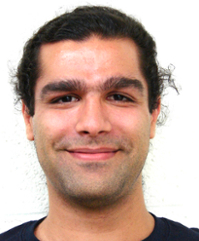Omid Saleh Ziabari
Graduate Student, The Brisson Lab

You work in a laboratory. What are you currently researching?
I’m interested in how evolution acts in natural populations, particularly in changing environments. So I study the relationship between the environment and the genetic forces upon which evolution operates. Environmentally controlled traits, like how royal honey diets in developing honeybees determine the worker/queen caste, rely on some environmental cue to drive the developmental of alternative traits. In contrast, some traits are entirely controlled by genetic factors. There’s a much longer list of examples here, but think of familiar examples from your biology textbooks like eye color and the number of fingers on your hand.
The framework I study this with is aphids, a small bug that you’re familiar with if you garden. Aphids are mostly asexual, where females give live birth to clonal daughters, for the majority of the season. These asexual females take in environmental cues, like how crowded a plant is with other aphids, and use it to produce winged migrants when a plant is overcrowded. These migrants can then move to a new plant and found a new asexual population. This environmental control of wing development is called phenotypic plasticity, and the aphid wing plasticity is a classic textbook example.
Aphids switch from asexual to sexual reproduction as autumn approaches, where they produce egg-laying females and males that produce an egg that can survive the winter. The males of some species also display winged and wingless morphs, but this trait is controlled by genetic factors. Our lab has mapped the genetic basis of the male wing pattern in one aphid species. As you might’ve guessed, in species where males are polymorphic (meaning they produce both winged and wingless morphs depending on genetic factors) that means we have females that are plastic (environmental control) that virtually have the same genotype as the males. So the question I study is how the control of wing development has evolved differently between males and females. Thanks for coming to my ted talk.
What was it that originally sparked your interest in biology?
I had a lot of naturalistic tendencies as a young lad. I would bring home critters and beasts to my mother’s chagrin. I found that nature is a great listener and better yet, doesn’t talk back. So I would hang with the trees and try to catch trout with my hands. I once bought a baby alligator at a flea market in Wisconsin for $10 but of course my parents made me return it. That might’ve motivated me to get my PhD and have the intellectual authority to pursue my naturalist instincts.
What do you enjoy most about working here at the U of R?
It’s academia so it’s such a privileged place to be. We get paid to ask and answer questions we find interesting, with a semblance of job security for its duration, in a city with a low enough cost of living to enjoy many frivolous pursuits (although the cost catches up to some of us). It’s a fun environment to work in because people don’t take themselves too seriously, and casual science is the best science. We’re not here to cure cancer, but instead try and understand some of the more basic processes that drives the diversity of nature. It’s nice to have a department where you can ask questions like ‘why does sex exist?’ and ‘is dispersal even adaptive?’ and engage in discourse even if it’s not our primary interest.
How do you unwind when you’re not in the lab?
In grad school, it’s important to have things to do that have nothing to do with science. Things where you can easily accomplish tasks and feel good when you complete them. This is especially pleasant when experiments are constantly failing for weeks. I don’t really have anything like that yet, but sometimes I go rock-climbing; sometimes I binge all the extended editions of the Hobbit and Lord of the Rings movies. Sometimes I enjoy getting last place in local bar trivia, and much less often, I enjoy getting third place in local bar trivia. Rochester has one of the best music schools in the nation with a lot of concerts, so during particularly stressful weeks, I like to unwind by reading a chapter from twelve books at a time over the course of many months, never actually finishing them as my own personal purgatory. Lastly, my favorite summer hobby is to stand in direct sunlight.
What is one thing about yourself that you’d like more people to know?
I never had good grades, and that’s okay. I think a lot of people think you must have been a stellar student to do science research, but the reality is that doing science is a different enterprise. It’s about determination and self-motivation, and dealing with successive ego blows and having things fail often. But failing is an inevitable part of the scientific process, and no scientist avoids it. I also think that science can be more accessible if students aren’t discouraged from seeking research in science because their grades aren’t competitive enough. Don’t get me wrong, it’s still an uphill battle, but it’s not improbable.
